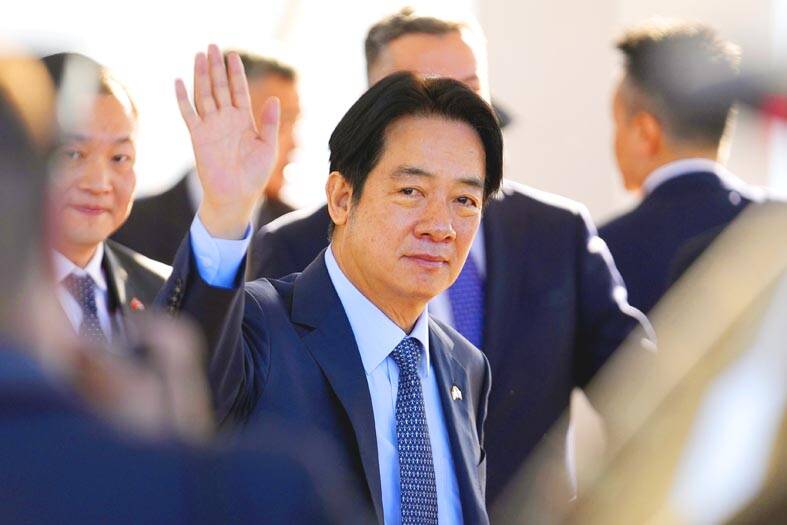Taiwan is a “sovereign, independent country,” Democratic Progressive Party (DPP) presidential candidate William Lai (賴清德) told Bloomberg Businessweek in an interview, adding that he had no plans to purse formal independence.
“Taiwan is already a sovereign, independent country called the Republic of China,” Vice President Lai said, echoing a stance President Tsai Ing-wen (蔡英文) made public three years ago, in his first interview with an international media outlet since becoming vice president in 2020.
“And in respect to unifying Taiwanese society, President Tsai has used the term Republic of China (Taiwan) to describe our country. I will continue to do so in the future,” he said. “There are no plans to change the name of our country.”

Photo: AP
“It is not necessary to declare independence,” he said in an interview aired on Tuesday while he is on a seven-day trip to the US and Paraguay. “The Republic of China and the People’s Republic of China are not subordinate to one another.”
Asked by editor Joel Weber about whether he has a road map to Taiwan’s formal independence, Lai, who has on more than one occasion described himself as a “pragmatic worker for Taiwan independence,” said “no such framework exists.”
“My responsibility is to maintain the status quo in the Taiwan Strait, while protecting Taiwan and maintaining democracy, peace and prosperity,” the 63-year-old said.
At the same time, Lai pitched himself as a “rational and steady” leader who is able to continue Tsai’s policy and work with the US government effectively.
“I have been part of President Tsai’s national security team,” which has “responsible and clear channels of communications” with Washington, he said.
Lai described next year’s presidential election as a decision between further engaging with the international community and working with China through caving in to its political agenda.
Lai is leading in most opinion polls, with Taiwan People’s Party Chairman Ko Wen-je (柯文哲) and New Taipei City Mayor Hou You-yi (侯友宜) of the Chinese Nationalist Party (KMT) trailing.
While stressing that he remains “open” to engaging in dialogue with China, Lai took note of the security challenges facing Taiwan because of Beijing’s “tendency to annex Taiwan” and refusal to denounce the use of force.
These challenges are of global concern, he said, adding that the international community must respond to China’s actions, which he said “are the reasons for tensions” in the Taiwan Strait.
Lai is in Paraguay for the inauguration of Paraguayan President Santiago Pena. Paraguay is one of only 13 UN member states to maintain diplomatic ties with Taipei.
He transited through New York on his way there, drawing anger from China, which said he was a separatist and “troublemaker,” and he is due back in Taipei on Friday after stopping over in San Francisco.
Additional reporting by Reuters

CHAOS: Iranians took to the streets playing celebratory music after reports of Khamenei’s death on Saturday, while mourners also gathered in Tehran yesterday Iranian Supreme Leader Ayatollah Ali Khamenei was killed in a major attack on Iran launched by Israel and the US, throwing the future of the Islamic republic into doubt and raising the risk of regional instability. Iranian state television and the state-run IRNA news agency announced the 86-year-old’s death early yesterday. US President Donald Trump said it gave Iranians their “greatest chance” to “take back” their country. The announcements came after a joint US and Israeli aerial bombardment that targeted Iranian military and governmental sites. Trump said the “heavy and pinpoint bombing” would continue through the week or as long

TRUST: The KMT said it respected the US’ timing and considerations, and hoped it would continue to honor its commitments to helping Taiwan bolster its defenses and deterrence US President Donald Trump is delaying a multibillion-dollar arms sale to Taiwan to ensure his visit to Beijing is successful, a New York Times report said. The weapons sales package has stalled in the US Department of State, the report said, citing US officials it did not identify. The White House has told agencies not to push forward ahead of Trump’s meeting with Chinese President Xi Jinping (習近平), it said. The two last month held a phone call to discuss trade and geopolitical flashpoints ahead of the summit. Xi raised the Taiwan issue and urged the US to handle arms sales to

BIG SPENDERS: Foreign investors bought the most Taiwan equities since 2005, signaling confidence that an AI boom would continue to benefit chipmakers Taiwan Semiconductor Manufacturing Co’s (TSMC, 台積電) market capitalization swelled to US$2 trillion for the first time following a 4.25 percent rally in its American depositary receipts (ADR) overnight, putting the world’s biggest contract chipmaker sixth on the list of the world’s biggest companies by market capitalization, just behind Amazon.com Inc. The site CompaniesMarketcap.com ranked TSMC ahead of Saudi Aramco and Meta Platforms Inc. The Taiwanese company’s ADRs on Tuesday surged to US$385.75 on the New York Stock Exchange, as strong demand for artificial intelligence (AI) applications led to chip supply constraints and boost revenue growth to record-breaking levels. Each TSMC ADR represents

Pro-democracy media tycoon Jimmy Lai’s (黎智英) fraud conviction and prison sentence were yesterday overturned by a Hong Kong court, in a surprise legal decision that comes soon after Lai was jailed for 20 years on a separate national security charge. Judges Jeremy Poon (潘兆初), Anthea Pang (彭寶琴) and Derek Pang (彭偉昌) said in the judgement that they allowed the appeal from Lai, and another defendant in the case, to proceed, as a lower court judge had “erred.” “The Court of Appeal gave them leave to appeal against their conviction, allowed their appeals, quashed the convictions and set aside the sentences,” the judges